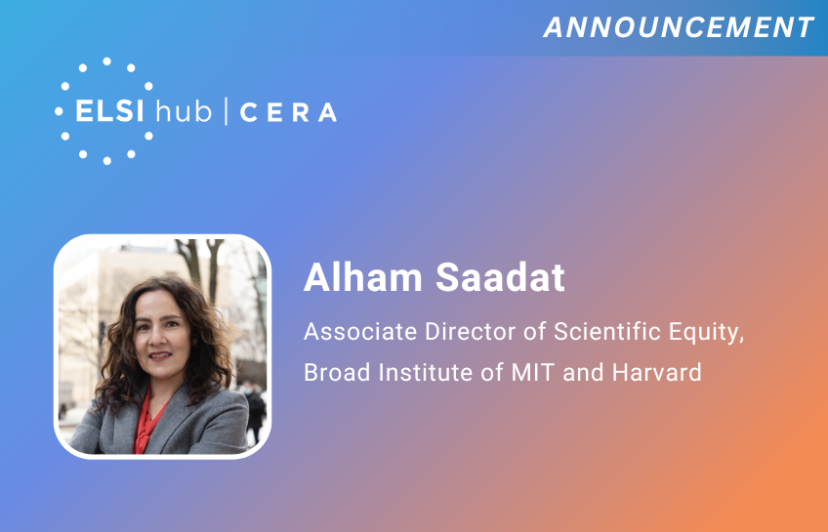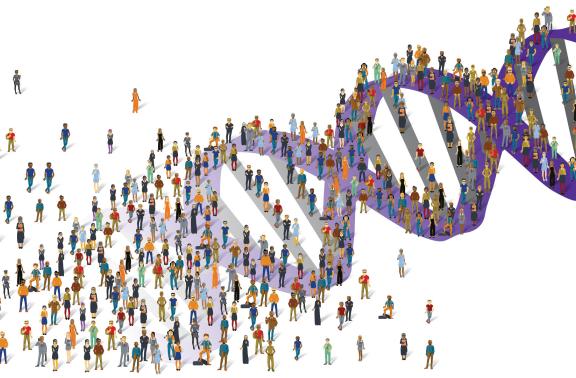
CERA Partnership with the Broad Institute of MIT and Harvard to Expand Ethics and Equity Resources for Genetics and Genomics
The Center for ELSI Resources and Analysis (CERA)—a collaboration and dissemination hub for the field of study focused on the ethical, legal, and social implications (ELSI) of genetics and genomics, funded by the National Human Genome Research Institute and managed by teams at Stanford and Columbia Universities—and the Broad Institute of MIT and Harvard are excited to announce a new partnership. The initiative will build on the collaborators’ strengths in ethics and health equity and create new programming and resources. The hope is that fostering close interaction between ELSI researchers and those engaged in basic and translational genetics and genomics research, will enhance the timeliness and utility of ELSI recommendations, engender their uptake, and inspire more exploration, on both sides, into the downstream health equity impacts of early decisions in the research pipeline.
Scientists with training and an interest in bioethical and social issues are critical to bridging epistemic and cultural gaps between the multidisciplinary set of stakeholders that are envisioned for this partnership. We spoke with our key collaborator, Alham Saadat, Associate Director of Scientific Equity at the Broad, about the current initiatives focused on ethics and health equity at the institute, her collaborative work with the CERA to date, and her hopes for our partnership over the coming years.
CERA: You are both a scientist who has contributed to research on cancer and neuropsychiatric and cardiometabolic diseases in roles at Genentech, Novartis, and Broad and an ethicist focused on increasing understanding of how decisions we make at all stages of a biomedical research project can impact health outcomes for people, particularly those that have been excluded and under-served. What inspired you to pursue both career tracks?
Ms. Saadat: I have always been inspired by the potential for biomedical research to positively impact people’s lives. My mother was diagnosed with rheumatoid arthritis when I was in high school. She experienced constant and severe pain daily until she was able to access treatment via the first fully-humanized monoclonal antibody treatment, Adalimumab (Humira). Within weeks, this treatment changed her quality of life fundamentally and allowed her to live without severe pain. This experience shaped my appreciation for how understanding the underlying biology of human health and disease and developing targeted therapies can be transformational in people’s lives. It was also one of the key drivers for why I chose to study microbiology.
I am a refugee from Afghanistan and have seen the negative impacts of health disparities within my family and community. For example, a rare genetic variant for colon cancer was not properly categorized as pathogenic in my family member. This led not just to a severe health outcome for them, but also one for their children several years later. This was the first time I understood the negative health impacts of having genetic data sets that do not sufficiently capture genetic variation beyond European ancestry populations, and it led me to explore other ways biomedical research may not be equitably benefiting diverse communities.
CERA: Could you please tell us about your current role as Associate Director of Scientific Equity at the Broad? What are you focusing on right now?
Ms. Saadat: Important work to address health equity has focused on domains closer to clinic and patient care—addressing issues and systems that cause people who have been underserved, under-resourced, marginalized, and adversely affected by persistent poverty and income inequality to have worse health outcomes. Much of the work we have done thus far has been to help our community of scientists to better understand that the decisions we make across all stages of biomedical research—even early-stage research—can contribute to health inequity. From the research questions, to the data sets and analytical tools that are used, to the way research is communicated, all these choices can have differential impacts during the translational and clinical stages of research.
We have done this work via our Equity in Biomedicine Seminar Series, which allows speakers to dive into the social and health equity implications of their work: Who is affected? How are they affected? Why? This series was co-created by a group of people at the Broad, including myself, who saw the need to take a step back from the science we were doing and interrogate and reflect on its health equity implications. Seminar topics are based on suggestions from our community and from members of our team. The overall goal is to foster discussions about equity and inspire Broad scientists and trainees to reflect on the impacts of their own research.
We have also developed educational workshops and resources that allow our community to better identify and engage with these issues. For example, we hosted a workshop, Inclusive Science Communication, at our 2023 annual retreat. During this session, we explored how the words, icons, colors, and other communication elements we choose impact how effectively our work is perceived and understood and whether it’s accessible to all people. We also co-created a workshop series with We All Count to help our researchers to identify subjective decision points in their research projects and navigate them in ways that align with their study and equity goals. In these workshops we covered:
- What data equity is and why it matters for genomics research
- The compelling case for why complete value neutrality cannot be the objective for genomics research
- How the kinds of choice points we all face in this field give us to opportunity to embed equity in our work
- Why we all need a cohesive system for identifying and addressing equity issues in data
We are encouraged that Broad researchers have reached out to say that they had not thought about the differential impact of their work for different populations and appreciated the discussions that highlighted these issues.
CERA: What avenues do you see for the Broad Institute to positively impact equity in genomics?
Ms. Saadat: The Broad is already doing work to positively impact equity in genomics. Research teams like those of Alicia Martin and Hailiang Huang, are developing new statistical methods to leverage cross-ancestry genomics data for insights into disease pathogenesis. These new tools can help overcome inequities caused by data sets with Eurocentric bias and increase the generalizability of knowledge gained from large-scale genetic studies across globally diverse, underrepresented, and medically under-served populations.
Capacity building by the institute in the Global South, via training programs like Global Initiative for Neuropsychiatric Genetics Education in Research (GINGER) and our Broad Global Health Initiative, are developing a future generation of researchers in their home countries to interrogate public health questions in ways that best serve their communities. We can build on this by expanding these efforts to other countries and institutions that do not have access to genomics technologies and training programs. Given our relationships with several partner institutions (MIT and Harvard) and hospitals (Massachusetts General Hospital, Dana-Farber Cancer Institute, and Brigham and Women's Hospital), we are well-positioned to coalesce a larger community of researchers, clinicians, and community partners to work collaboratively via interdisciplinary teams to positively impact equity in genomics.
CERA: In February of 2024 you started to provide Broad Institute scientists with consultation on ethics and equity issues they encounter during their research. What do you think motivates your consultees to seek an ethics consultation? Are they seeking guidance at the right time?
Ms. Saadat: The timing varies across consultations, with some folks reaching out very early in the research lifecycle and others closer to publication/dissemination. Seeking consultation at even late stages is of course better than not seeking guidance. We do think that the earlier ethical issues are surfaced, the more options there are for how to address them effectively.
CERA: The ELSIhub Collection you curated for the CERA, Community Engagement in Genomic Research, has garnered over 200 views so far. Among other topics, it includes recommendations from communities about how to engage them in research. One of the more challenging recommendations in this space is that communities be involved in the determination of research agendas. What opportunities or challenges do you see at the Broad for engaging communities in priority setting at the institute?
Ms. Saadat: I think there can be many opportunities in engaging communities in priority setting at the Broad and similar institutes. Engaging communities allows research priorities to be more aligned toward patients, which can result in outcomes that directly benefit communities, enhance health equity, and improve public health. It can also foster transparency and mutual trust between researchers and the public, which makes it easier to translate scientific findings into public policy or health interventions. In addition, community involvement brings in diverse perspectives, lived experiences, and cultural insights that researchers may not have considered. This diversity can drive innovation and uncover new research directions or methods.
However, there are many challenges in having communities set priorities at the institute. Communities may have different or immediate concerns that do not align with long-term scientific research goals. This mismatch can create frustration on both sides, with researchers feeling that community concerns distract from core scientific inquiries, while communities may perceive the institute as unresponsive to their needs. Engaging communities requires significant time, effort, and resources. Institutes may struggle to allocate the necessary personnel and funding to sustain meaningful community involvement. Communities are often heterogeneous, with varied perspectives, needs, and interests. It can be challenging to balance and integrate these diverse viewpoints into a coherent research agenda. Partnering and sharing resources across the research ecosystem–with other institutions, community partners, funding agencies, and academic journals–can be a productive step toward addressing these issues.
CERA: In November, you are collaborating with Mildred Cho, Sandra Lee, Maya Sabatello, and Kellan Baker on an American Society of Human Genetics (ASHG) workshop, Building Understanding and Practical Skills in Community Engagement for Genetic Research, that will use community-engaged research cases to illustrate why and when engagement is needed to enhance both scientific and ethical quality. What challenges do you see for genome scientists who do not have experience with community engaged research but now recognize the need to change their research practices?
Ms. Saadat: I think there are several challenges for scientists looking to do this work well. First, a lack of time and resources for community engagement can be a challenge. Engagement can be time-consuming and requires effort and financial support to establish trust and understanding. Many researchers may not have the time or funding to dedicate to these efforts. A second barrier is limited training and skills. Scientists may not have the skills or experience in communication, public engagement, or outreach that are necessary to effectively engage with communities. This lack of training and institutional resources to support the work can make the process seem daunting or outside their expertise. Third, academic and institutional priority setting can hinder a focus on engagement. There is often a focus on publishing in high-impact journals and securing funding, which often do not prioritize or reward community engagement. Scientists may feel they need to focus on activities that are directly tied to the academic advancement of their trainees and group advancement.
Systemic changes are needed to address these challenges. Funding agencies can incentivize community engagement by providing dedicated resources for this work. Journals can introduce special sections or issues focused on community-engaged or participatory research, showcasing how collaboration with communities improves research outcomes and social impact. They can feature case studies of successful community-engaged research in prominent articles or editorials to inspire and map out a path for others to adopt similar practices. Lastly, research institutes can provide resources, in the form of dedicated staff with expertise in community engagement and established relationships with community partners. Together, these types of systemic change can provide the ecosystem required to do this work well.
CERA: ELSI scholars often envision genome scientists as the audience for their work and we are excited to extend the CERA network and enable the dissemination of ELSI materials to all 1,300 scientists at the Broad and your 3,000 newsletter subscribers. What new opportunities do you see for co-creating educational materials, resources, or forums with CERA aimed at sharing ELSI research with scientists at the Broad and beyond?
Ms. Saadat: We have already shared many of the wonderful CERA resources with our community via the Broad Bioethics Initiative. I look forward to co-creating events that bring together the Equity in Biomedicine Seminar Series and ELSI Friday Forum. There is significant alignment between the goals of these two efforts and I look forward to working with the CERA team to identify sessions that would be engaging and impactful for our communities. As one example, the exclusion of data from minority groups at the analysis stage due to fear of confounding and lack of statistical power was framed as an ethical issue in need of urgent attention at the recent ELSI Friday Forum, Enhancing Access for Historically Marginalized Populations Using the Translational Genomics Pipeline, by speakers Shawneequa Callier and Melissa Davis. This catalyzed discussions with CERA about developing and distributing educational materials to researchers, funders, journal editors, and reviewers as actionable ways to move recommendations, like these and others, forward.
CERA: What is most exciting to you about the Broad/CERA partnership?
Ms. Saadat: I would love to see a future where ELSI researchers don’t just see genome scientists as their audience, but as their partners in this work. I think multidisciplinary work between ethicists and scientists, where both groups can bring issues forward for scholarship and incorporate their diverse expertise, will lead to the most impact.
Sign up to receive the latest updates from the Center for ELSI Resources and Analysis.


